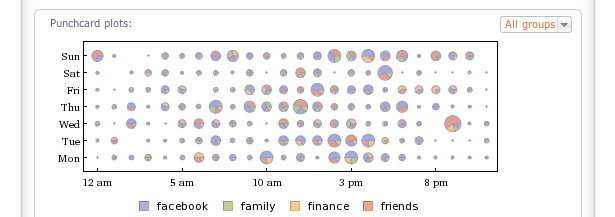I want to extend BinCounts to work on a list of times or dates, binning them by Day, Week, Hour of the Month, Day of the Year, etc... So given a list of times and a time bin spec, I need to calculate the bin counts.
One example might be if I have list of times I've been on Facebook and I want to to plot these times on a 2D Histogram where the Y axis is "MinuteOfTheDay" and the x axis is "DayOfTheWeek". Alpha can already do this (but not with arbitrary time bins)

To clarify my question I made a prototype:
d = RandomDates[1000];
Timing[TimeBinCounts[d, {"Day", "Week"}]]
gives the proper counts {157, 150, 136, 147, 149, 129, 132}, (e.g. Count[DayOfWeek /@ d, Monday] == 157). And queries like
Timing[TimeBinCounts[d, {"Month", "Year"}]]
work too, but I'm not sure how to handle an arbitrary time bin spec like "HoursOfTheWeek"
Timing[TimeBinCounts[d, {"Hour", "Week"}]]
Will not work...
<<Calendar`
TimeBinCounts::badspec = "The time bin spec `1` is not acceptable.";
DaysOfTheWeek = {Monday, Tuesday, Wednesday, Thursday, Friday, Saturday, Sunday};
daysNum = Thread[Rule[DaysOfTheWeek, Range[7]]];
RandomDateList[] := {RandomInteger[{1800, 2100}], RandomInteger[{1, 12}], RandomInteger[{1, 28}], RandomInteger[{0, 23}], RandomInteger[{0, 59}], RandomInteger[{0, 59}]};
RandomDates[n_] := Table[RandomDateList[],{n}]
TimeSpecHelper[spec_] := Module[
{types, convert, result},
types = {"Second", "Minute", "Hour", "Day", "Week", "Month", "Year"};
convert = {60, 60, 24, 7, 4.345, 12};
result = Range[Times @@ Part[convert, Most[Range @@ Flatten[
First[Position[types, #]]& /@ spec]]]];
If[MatchQ[spec[[1]], "Second"|"Minute"|"Hour"],
result - 1,
result
]
]
TimeBinCounts[times_List, spec_] := Module[
{dayorder, bins, minDate, maxDate, order},
minDate = Min[times[[All, 1]]];
maxDate = Max[times[[All, 1]]];
order = Thread[Rule[{"Second", "Minute", "Hour", "Day", "Week", "Month", "Year"}, Range[7]]];
If[Greater @@ (spec /. order),
Message[TimeBinCounts::badspec, spec];
Return[$Failed];
];
Switch[spec,
{"Day","Week"} | "Day",
With[{days = DayOfWeek /@ times /. daysNum},
BinCounts[days, {1, 8, 1}]],
{"Hour", "Day"}|"Hour",
BinCounts[times[[All, 4]], {0, 24, 1}],
{"Day", "Month"},
BinCounts[times[[All, 3]], {1, 32, 1}],
{"Month", "Year"}|"Month",
BinCounts[times[[All, 2]], {1, 13, 1}],
"Year",
With[{interval = Range[minDate[[1]], maxDate[[1]]]},
Count[times[[All, 1]], #]& /@ interval
],
_,
order = Thread[Rule[{"Second", "Minute", "Hour", "Day", "Month", "Year"},
Range[6]]];
With[{interval = TimeSpecHelper[spec]},
Count[Mod[times[[All, 6 - (spec[[1]] /. order) + 1]], Length[interval]], #]& /@ TimeSpecHelper[spec]
]
]
]

GatherBymight be what you need. $\endgroup$GatherByis not enough on its own. But something like{First[#],Last[#]}& @@@ GatherBy[data,datespec]might work. $\endgroup$DayOfWeekfunction, and here I show one possible way to significantly speed it up with the help of Java. $\endgroup$